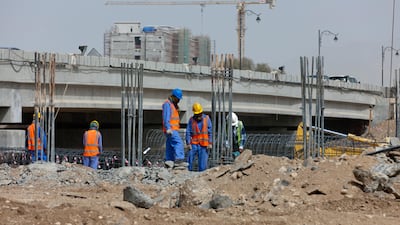Indian national Ravi Dilwalla and his two compatriots live in an abandoned construction site on the eastern side of the Omani capital. It has been their home for the last nine days, but won't be for much longer. Every two weeks, they are on the move, looking for other squalid “accommodation” to escape detection by labour inspectors looking for illegal foreign workers.
They survive by doing odd jobs, which are hard to come by, and sometimes the search leads to grievous consequences at the hands of other illegal workers.
"My friend was severely stabbed by a Pakistani man for taking his customers by charging only half the price to wash their cars," Mr Dilwalla told The National. "He was in hospital for two weeks and then got deported because he entered the country illegally. They never found the man who stabbed him."
There are no official statistics on how many illegal workers — the term used by the manpower ministry to define foreign nationals entering the country without valid documents — are in Oman. However, some labour experts have put the figure at more than 100,000 workers.
“They enter [the country] mainly by sea on vessels [owned by human smugglers] going mostly between the UAE and Oman,” said Hareb Al Falahy, an independent manpower consultant. “It is difficult to know exactly how many are here with illegal status, but 100,000 or above is not an exaggeration.”
Oman has the longest shoreline in the Gulf, stretching for 1,700 kilometres. According to EU statistics, the international waters off Omani territory are among the busiest in the world because of oil exports from other Gulf countries.
According to Mr Al Falahy, the favourite drop point for human smuggling is at Musandam Peninsula. It faces the Strait of Hormuz, a narrow waterway channel shared by both Oman and Iran.
In 2010, Oman gave amnesty to illegal workers and more than 70,000 of them returned to their homelands that year. Most of the deported foreign workers were from India, Pakistan and Bangladesh and working in Muscat.
Mohammed Rahman, a Bangladeshi, is on his second stint as an illegal worker. He was sent home in 2010 but found his way back to Oman from the UAE in 2015.
“I lost my job as a bricklayer in the UAE and decided to pay Dh3,500 to an Indian [man] with a fishing trawler to come to Musandam from Fujairah,” he said. “There were 14 of us in that vessel. The sailing took us four hours and we were dropped off on the beach.
“Most of us had friends waiting for us to put us up in temporary accommodation.”
Mr Rahman makes an average of about 180 Omani rials (Dh1,765) per month from odd jobs, such as gardening and washing cars. After sending home half of his earnings, he has very little left for rent, bills and food.
“I decided to live rough to save money," he said. "Sometimes in the mosques, in the cow sheds on farms or construction sites with my friends,” he said.
Coastal patrol officers said stamping out people smuggling is difficult.
"It is a thriving business. It mostly goes on from Oman to the UAE or vice versa. People make money from it," a coastguard, who did not want to be identified, told The National. "It is hard to stop because Oman has a very open coastline, and we don't have the resources to patrol every square kilometre of the sea."
Residents in most towns of Oman are wary of thousands of undocumented foreign workers living in the country with no fixed address or proper papers.
“If they commit a crime, where would you get them? They move around from one town to another. It is also frightening to know that they are around in large numbers without money or food,” said Suleiman Al Haddafi, a Muscat resident.
Some residents get nervous when the workers knock on their doors looking for jobs, such as gardening, cleaning or car washing.
“They roam the streets and go door-to-door looking for work," said Ghalib Al Fazzari, who lives in Musannah in the Batnah region. "They don’t demand much payment — anything will do — but how can you trust people staying in the country illegally, especially when they are desperate for cash?”

